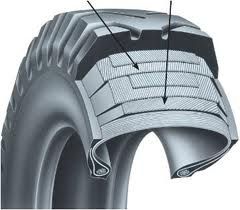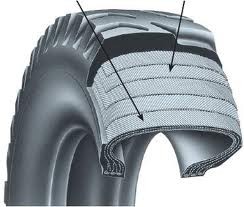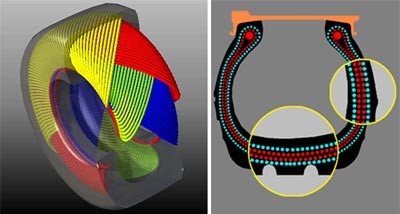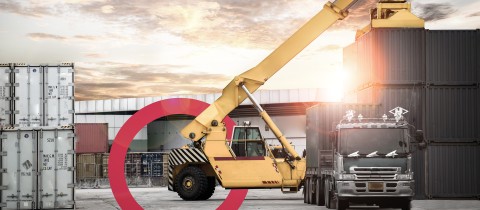What is the difference between radial tyres and diagonal tyres?
Radial tyres
Radial tyres were developed in 1946. There was a need for more flexible tyres, which were able to absorb shocks generated by road surfaces. These tyres are also stronger, which means machines can be operated at higher capacities.
In radial tyres, steel cord plies are placed on the heel of the tyre, and a belt is placed across the casing. Because cord plies are placed directly on top of each other, the side walls of radial tyres remain very flexible.

Advantages of radial tyres
- Good steering and better road contact
- Improved driving comfort thanks to flexible side wall
- Little heat generated in tyre at high speeds
- Higher resistance against tread-related damage
- Lower fuel consumption
Disadvantages of radial tyres
- Less stable side wall under heavy loads
- More susceptible to collisions in the side wall
Diagonal tyres
Diagonal tyres have been used instead of solid rubber tyres since 1898. They were a standard feature in the car industry before radial tyres were introduced. Diagonal tyres consist of casing layers made from nylon cord. They are placed diagonally across each other in the tread and the side walls, at an angle of 55 degrees. Diagonal tyres are used, for example, to perform activities in ports, often on reach stackers.

Advantages of diagonal tyres
- High vehicle stability
- Higher resistance against side wall damage
Disadvantages of diagonal tyres
- Higher rolling resistance, which means the tyre quickly heats up
- Reduced comfort due to the tyre's rigidity
- Increased fuel consumption

Like to know more?
Do you need advice? Please contact us, our experts will be pleased to assist you. Contact our experts at +31 (0)523 - 850 850 or by e-mail to info@heuver.com. You can also read all about OTR on the OTR knowledge-page.
About Heuver
Register and contact
Do you want access to our webshop? Request your account here.
You will always receive expert and detailed advice from us. Contact one of our expert employees on +31 (0) 523 850 850 or complete the contact form.
Contact-

-
 Say hi
Say hi
-
 Hi volume
Hi volume
-
 Hi speed
Hi speed
-
 Hi score
Hi score
-
 Hi class
Hi class

